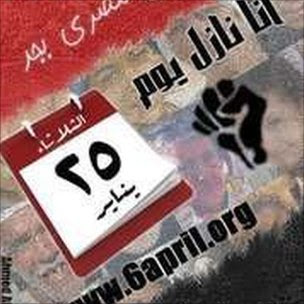Occupy Wall Street and “The American Autumn”: Is It a “Colored Revolution”?
Part I

There is a grassroots protest movement unfolding across America, which includes people from all walks of life, from all age groups, conscious of the need for social change and committed to reversing the tide.
The grassroots of this movement constitutes a response to the “Wall Street agenda” of financial fraud and manipulation which has served to trigger unemployment and poverty across the land.
Does this movement constitute in its present form an instrument of meaningful reform and social change in America?
What is the organizational structure of the movement? Who are its main architects?
Has the movement or segments within this movement been co-opted?
This is an important question, which must be addressed by those who are part of the Occupy Wall Street Movement as well as those who, across America, support real democracy.
Introduction
Historically, progressive social movements have been infiltrated, their leaders co-opted and manipulated, through the corporate funding of non-governmental organizations, trade unions and political parties. The ultimate purpose of “funding dissent” is to prevent the protest movement from challenging the legitimacy of the economic elites:
“In a bitter irony, part of the fraudulent financial gains on Wall Street in recent years have been recycled to the elites’ tax exempt foundations and charities. These windfall financial gains have not only been used to buy out politicians, they have also been channelled to NGOs, research institutes, community centres, church groups, environmentalists, alternative media, human rights groups, etc.
The inner objective is to “manufacture dissent” and establish the boundaries of a “politically correct” opposition. In turn, many NGOs are infiltrated by informants often acting on behalf of western intelligence agencies. Moreover, an increasingly large segment of the progressive alternative news media on the internet has become dependent on funding from corporate foundations and charities.
The objective of the corporate elites has been to fragment the people’s movement into a vast “do it yourself” mosaic.” (See Michel Chossudovsky, Manufacturing Dissent: the Anti-globalization Movement is Funded by the Corporate Elites, Global Research, September 20, 2010)
“Manufacturing Dissent”
At the same time, “manufactured dissent” is intent upon promoting political and social divisions (e.g. within and between political parties and social movements). In turn, it encourages the creation of factions within each and every organization.
With regard to the anti-globalization movement, this process of division and fragmentation dates back to the early days of the World Social Forum. (See Michel Chossudovsky, Manufacturing Dissent: The Anti-globalization Movement is Funded by the Corporate Elites, Global Research, September 20, 2010)
Most of the progressive organizations of the post-World War II period, including the European “Left” have, in the course of the last thirty years, been transformed and remoulded. The “Free Market” system (Neoliberalism) is the consensus of the “Left”. This applies, among others, to the Socialist Party in France, the Labour Party in Britain, the Social Democrats in Germany, not to mention the Green Party in France and Germany.
In the US, bi-partisanship is not the result of the interplay of Congressional party politics. A handful of powerful corporate lobby groups control both the Republicans and the Democrats. The “bi-partisan consensus” is established by the elites who operate behind the scenes. It is enforced by the main corporate lobby groups, which exert a stranglehold over both major political parties.
In turn, the leaders of the AFL-CIO have also been co-opted by the corporate establishment against the grassroots of the US labor movement.
The leaders of organized labor attend the annual meetings of the Davos World Economic Forum (WEF). They collaborate with the Business Roundtable. But at the same time, the grassroots of the US labor movement has sought to to carry out organizational changes which contribute to democratizing the leadership of individual trade unions.
The elites will promote a “ritual of dissent” with a high media profile, with the support of network TV, the corporate news as well as the internet.
The economic elites — which control major foundations — also oversee the funding of numerous civil society organizations, which historically have been involved in the protest movement against the established economic and social order. The programs of many NGOs (including those involved in the Occupy Wall Street Movement) rely heavily on funding from private foundations including the Ford, Rockefeller, MacArthur, Tides foundations, among others.
Historically, the anti-globalization movement which emerged in the 1990s has opposed Wall Street and the Texas oil giants controlled by Rockefeller, et al. Yet the foundations and charities of Rockefeller, Ford et al have, over the years, generously funded progressive anti-capitalist networks as well as environmentalists (opposed to Big Oil) with a view to ultimately overseeing and shaping their various activities.
“Colored Revolutions”
In the course of the last decade, “colored revolutions” have emerged in several countries. The “colored revolutions” are US intelligence ops which consist in covertly supporting protest movements with a view to triggering “regime change” under the banner of a pro-democracy movement.
“Colored revolutions” are supported by the National Endowment for Democracy, the International Republican Institute and Freedom House, among others. The objective of a “colored revolution” is to foment social unrest and use the protest movement to topple the existing government. The ultimate foreign policy goal is to instate a compliant pro-US government (or “puppet regime”).
“The Arab Spring”
In Egypt’s “Arab Spring”, the main civil society organizations including Kifaya (Enough) and The April 6 Youth Movement were not only supported by US based foundations, they also had the endorsement of the US State Department. (For details see Michel Chossudovsky, The Protest Movement in Egypt: “Dictators” do not Dictate, They Obey Orders, Global Research, January 29, 2011)

Egyptian dissidents, Fellows of Freedom House in Washington DC (2008)
“In a bitter irony, Washington supported the Mubarak dictatorship, including its atrocities, while also backing and financing its detractors,… Under the auspices of Freedom House, Egyptian dissidents and opponents of Hosni Mubarak (see above) were received in May 2008 by Condoleezza Rice … and White House National Security Adviser Stephen Hadley.” (See Michel Chossudovsky, The Protest Movement in Egypt: “Dictators” do not Dictate, They Obey Orders, Global Research, January 29, 2011)
The following year (May 2009), a delegation of Egyptian dissidents was received by Secretary of State Hillary Clinton (See below)

US Secretary of State Hillary Clinton speaks with “Egyptian activists promoting freedom and democracy”, prior to meetings at the State Department in Washington, DC, May 28, 2009.
Compare the two pictures. Part of the 2008 delegation meeting Condoleeza Rice is part of the 2009 delegation meeting Hillary Clinton
OTPOR and the Centre for Applied Non Violent Action and Strategies (CANVAS)
Dissidents of Egypt’s April 6 Youth Movement, which, for several years, was in permanent liaison with the US Embassy in Cairo, were trained by Serbia’s Centre for Applied Non Violent Action and Strategies (CANVAS), a consulting and training firm specializing in “Revolution” supported by FH and the NED.
CANVAS was established in 2003 by OTPOR, a CIA supported Serbian organization which played a central role in the downfall of Slobodan Milosevic in the wake of the 1999 NATO bombing of Yugoslavia.
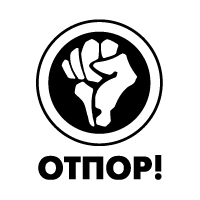
Barely two months after the end of the 1999 bombings of Yugoslavia, OTPOR was spearheaded into playing a central role in the installation of a US-NATO sponsored “caretaker” government in Serbia. These developments also paved the way towards the secession of Montenegro from Yugoslavia, the establishment of the US Bondsteel military base and the eventual formation a Mafia State in Kosovo.
In August 1999, the CIA is reported to have set up a training program for OTPOR in Bulgaria’s capital Sofia:
“In the summer of 1999, the head of the CIA, George Tenet, set up shop in Sofia, Bulgaria to “educate” the Serb opposition. Last August. 28 [2000], the BBC confirmed that a special 10-day class had been given to the Otpor militants, also in Sofia.
The CIA program is a program in successive phases. Early on, they flatter the Serbs’ patriotism and spirit of independence, acting as if they respect these qualities. But after having sown confusion and broken the unity of the country, the CIA and NATO would go much further.”
(Gerard Mugemangano and Michel Collon, “To be partly controlled by the CIA ? That doesn’t bother me much.”, Interview with two activists of the Otpor student movement, International Action Center (IAC), To be partly controlled by the CIA ? October 6, 2000. See also “CIA is tutoring Serbian group, Otpor“, The Monitor, Sofia, translated by Blagovesta Doncheva, Emperors Clothes, September 8, 2000 )
“The Revolution Business”
OTPOR’s Centre for Applied Non Violent Action and Strategies (CANVAS) describes itself as “an International network of trainers and consultants” involved in the “Revolution Business”. Funded by the National Endowment for Democracy (NED), it constitutes a consulting outfit, advising and training US sponsored opposition groups in more than 40 countries.
OTPOR played a key role in Egypt.
Egypt Tahir Square: What appeared to be a spontaneous democratization process was a carefully planned intelligence operation. View video below.

http://www.youtube.com/watch?v=lpXbA6yZY-8

Egypt. The Logo of the April 6 Movement
Egypt’s “April 6 Youth Movement,” the same fist logo, Source Infowars
Both the April 6 Movement and Kifaya (Enough!) received prior training from CANVAS in Belgrade “in the strategies of non-violent revolution”. “According to Stratfor, The tactics used by the April 6 Movement and Kifaya “were straight out of CANVAS’s training curriculum.” (Quoted in Tina Rosenberg, Revolution U, Foreign Policy, February 16, 2011 )
It is worth noting the similarity of the logos as well as the names involved in CANVAS-OTPOR sponsored “Colored Revolutions” The April 6 Youth Movement in Egypt used the clenched fist as its logo, Kifaya (“Enough!”) has the same name as the Youth Protest movement supported by OTPOR in Georgia which was named Kmara! (“Enough!”). Both groups were trained by CANVAS.
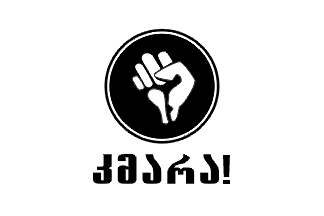
Georgia’s Kmara (“Enough!”)
The Role of CANVAS-OTPOR in the Occupy Wall Street Movement
CANVAS-OPTOR is currently involved in the Occupy Wall Street Movement (#OWS).
Several key organizations currently involved in The Occupy Wall Street (#OWS) movement played a significant role in “The Arab Spring”. Of significance, “Anonymous“, the social media “hacktivist” group, was involved in waging cyber-attacks on Egyptian government websites at the height of “The Arab Spring”.(http://anonops.blogspot.com, see also http://anonnews.org/)
In May 2011, “Anonymous” waged cyberattacks on Iran and last August, it waged similar cyber-attacks directed against the Syrian Ministry Defense. These cyber-attacks were waged in support of the Syrian “opposition” in exile, which is largely integrated by Islamists. (See Syrian Ministry Of Defense Website Hacked By ‘Anonymous’, Huffington Post, August 8, 2011).
The actions of “Anonymous” in Syria and Iran are consistent with the framework of the “Colored Revolutions”. They seek to demonize the political regime and create political instability. (For analysis on Syria’s Opposition, see Michel Chossudovsky, SYRIA: Who is Behind The Protest Movement? Fabricating a Pretext for a US-NATO “Humanitarian Intervention” Global Research, May 3, 2011)
Both CANVAS and Anonymous are now actively involved in the Occupy Wall Street Movement.
The precise role of CANVAS in the Occupy Wall Street Movement remains to be assessed.
Ivan Marovic, a leader of CANVAS recently addressed the Occupy Wall Street protest movement in New York City. Listen carefully to his speech. (Bear in mind that his organization CANVAS is supported by NED).
Click link below to listen to Ivan Marovic’s address to Occupy Wall Street in New York City
Ivan Marovic addresses Occupy Wall Street
http://www.youtube.com/watch?v=LkM3BBtc7N0
Marovic acknowledged in an earlier statement that there is nothing spontaneous in the planning of a “revolutionary event”:
“It looks like people just went into the street. But it’s the result of months or years of preparation. It is very boring until you reach a certain point, where you can organize mass demonstrations or strikes. If it is carefully planned, by the time they start, everything is over in a matter of weeks.” (Quoted in Tina Rosenberg, Revolution U, Foreign Policy, February 16, 2011)
This statement by OTPOR’s spokesperson Ivan Marovic would suggest that the protest movements in the Arab World did not spread spontaneously from one country to another, as portrayed by the Western media. The national protest movements were planned well in advance. The chronology and sequencing of these national protest movements were also planned.
Similarly, Maravic’s statement also suggests that The Occupy Wall Street movement was also the object of careful advanced planning by a number of key organizations on tactics and strategy.
It is worth noting that one of OTPOR’s tactics is “not try to avoid arrests”, but rather to “provoke them and use them to the movement’s advantage.” as a PR strategy. (Ibid)

Occupy Wall Street Clenched Fist on http://occupywallst.org
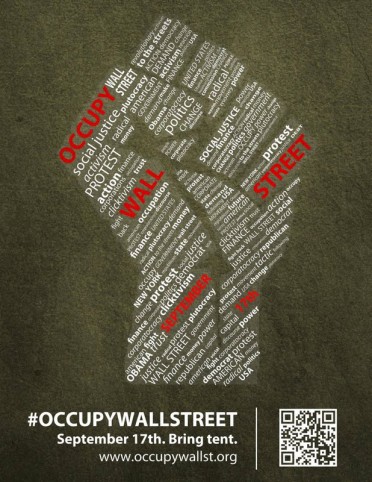

PORA; Its Time!
KMARA Enough!
OBORONA Defense
KELKEL New epoch
PART II of this article will examine the mainstay of the Occupy Wall Street movement, including the role of NGO organizers.
Global Research is pleased to announce the publication of a new book entitled The Global Economic Crisis, The Great Depression of the XXI Century, Michel Chossudovsky and Andrew Gavin Marshall, Editors.
“This important collection offers the reader a most comprehensive analysis of the various facets – especially the financial, social and military ramifications – from an outstanding list of world-class social thinkers.”
This title is available at a special introductory price for Global Research readers for $15.00 plus s&h (list price $25.95).
The book is also available on Amazon and in selected bookstores in the US (distributed by Ingram).
Scroll down for details.
The Global Economic Crisis
The Great Depression of the XXI Century
Michel Chossudovsky and Andrew Gavin Marshall (Editors)
Montreal, Global Research Publishers. Centre for Research on Globalization (CRG), 2010.
ISBN 978-0-9737147-3-9 (416 pages)
Special Offer $15.00 plus S&H (includes taxes where applicable) (List Price US$25.95 plus taxes)
(if you wish to purchase 3 or more copies, scroll down for discounted price)
Purchases by Mail
Mail order Form (Print, Fill out the Form and Send to Global Research (optional)
Send your cheque or money order made out to the “CRG” to the following address:
Centre for Research on Globalization (CRG)
PO Box 55019
11 Ouest Notre-Dame,
MONTREAL, Qc, H2Y 4A7
CANADA
This book takes the reader through the corridors of the Federal Reserve, into the plush corporate boardrooms on Wall Street where far-reaching financial transactions are routinely undertaken.
Each of the authors in this timely collection digs beneath the gilded surface to reveal a complex web of deceit and media distortion which serves to conceal the workings of the global economic system and its devastating impacts on people`s lives.
“This important collection offers the reader a most comprehensive analysis of the various facets – especially the financial, social and military ramifications – from an outstanding list of world-class social thinkers.” -Mario Seccareccia, Professor of Economics, University of Ottawa
“In-depth investigations of the inner workings of the plutocracy in crisis, presented by some of our best politico-economic analysts. This book should help put to rest the hallucinations of ‘free market’ ideology.” -Michael Parenti, author of God and His Demons and Contrary Notions
“Provides a very readable exposé of a global economic system, manipulated by a handful of extremely powerful economic actors for their own benefit, to enrich a few at the expense of an ever-growing majority.” -David Ray Griffin, author of The New Pearl Harbor Revisited
The complex causes as well as the devastating consequences of the economic crisis are carefully scrutinized with contributions from Ellen Brown, Tom Burghardt, Michel Chossudovsky, Richard C. Cook, Shamus Cooke, John Bellamy Foster, Michael Hudson, Tanya Cariina Hsu, Fred Magdoff, Andrew Gavin Marshall, James Petras, Peter Phillips, Peter Dale Scott, Bill Van Auken, Claudia von Werlhof and Mike Whitney.
Despite the diversity of viewpoints and perspectives presented within this volume, all of the contributors ultimately come to the same conclusion: humanity is at the crossroads of the most serious economic and social crisis in modern history.
The Global Economic Crisis
The Great Depression of the XXI Century
Michel Chossudovsky and Andrew Gavin Marshall (Editors)
click link to order
The Global
Economic Crisis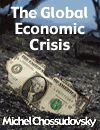
Michel Chossudovsky
Andrew G. Marshall (editors)
TO READ THE PREFACE, CLICK HERE
TABLE OF CONTENTS
Preface Michel Chossudovsky
PART I THE GLOBAL ECONOMIC CRISIS
Chapter 1 The Global Economic Crisis: An Overview Michel Chossudovsky
Chapter 2 Death of the American Empire Tanya Cariina Hsu
Chapter 3 Financial Implosion and Economic Stagnation John Bellamy Foster and Fred Magdoff
Chapter 4 Depression: The Crisis of Capitalism James Petras
Chapter 5 Globalization and Neoliberalism: Is there an Alternative to Plundering the Earth? Claudia von Werlhof
Chapter 6 The Economy’s Search for a “New Normal” Shamus Cooke
PART II GLOBAL POVERTY
Chapter 7 Global Poverty and the Economic Crisis Michel Chossudovsky
Chapter 8 Poverty and Social Inequality Peter Phillips
PART III WAR, NATIONAL SECURITY AND WORLD GOVERNMENT
Chapter 9 War and the Economic Crisis Michel Chossudovsky
Chapter 10 The “Dollar Glut” Finances America’s Global Military Build-Up Michael Hudson
Chapter 11 Martial Law, the Financial Bailout and War Peter Dale Scott
Chapter 12 Pentagon and Intelligence Black Budget Operations Tom Burghardt
Chapter 13 The Economic Crisis “Threatens National Security” in America Bill Van Auken
Chapter 14 The Political Economy of World Government Andrew Gavin Marshall
PART IV THE GLOBAL MONETARY SYSTEM
Chapter 15 Central Banking: Managing the Global Political Economy Andrew Gavin Marshall
Chapter 16 The Towers of Basel: Secretive Plan to Create a Global Central Bank Ellen Brown
Chapter 17 The Financial New World Order: Towards A Global Currency Andrew Gavin Marshall
Chapter 18 Democratizing the Monetary System Richard C. Cook
PART V THE SHADOW BANKING SYSTEM
Chapter 19 Wall Street’s Ponzi Scheme Ellen Brown,
Chapter 20 Securitization: The Biggest Rip-off Ever Mike Whitney
TO READ THE PREFACE CLICK HERE
Purchase the Global Economic Crisis. The Great Depression of the XXI Century, Michel Chossudovsky and Andrew Gavin Marshall (Editors)
Special Pre-Publication Offer: $15.00 plus s&h (includes taxes where applicable) (List Price US$25.95 plus taxes)


